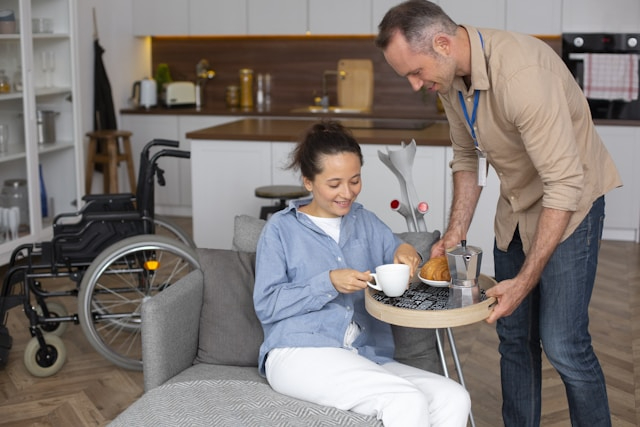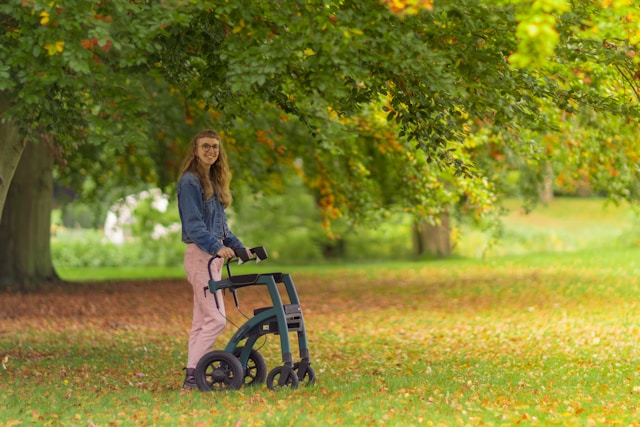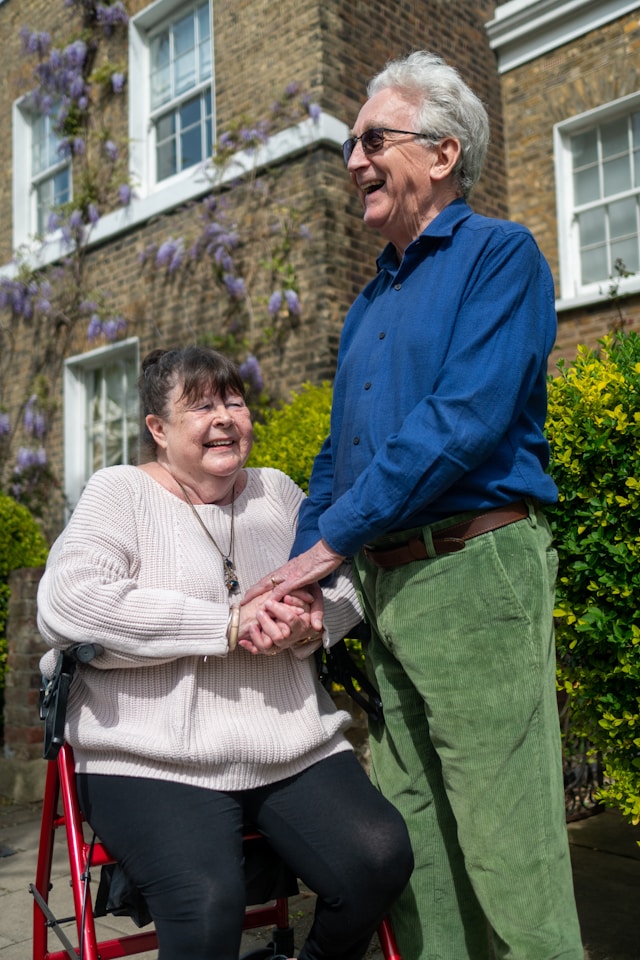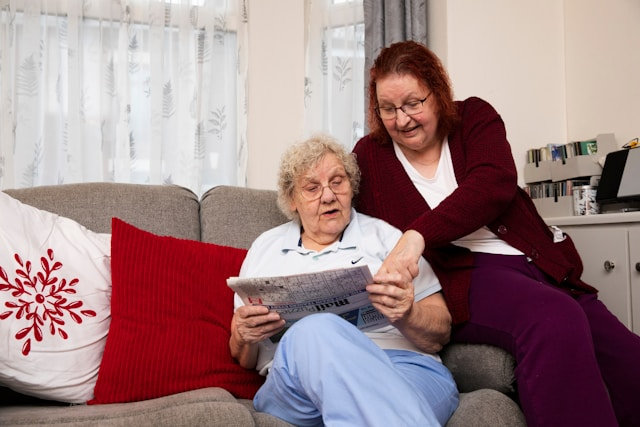
Supporting Adults Under 65 With Neurological Conditions
When we think about care homes, we often picture older adults in their retirement years. But the reality is that many people under the age of 65 are living with neurological conditions that affect their daily lives and wellbeing. For these younger adults, the need for specialist support is just as important, though it often looks a little different. Whether someone is living with Multiple Sclerosis, Parkinson’s, or a traumatic brain injury (TBI), which affects brain function and brain cells, leading to cognitive impairments and other neurological issues, the right care can make a world of difference.
Everyone deserves to live with dignity, purpose, and the right support to meet their unique needs, and care for younger adults with neurological conditions can be shaped around the individual, ensuring comfort, companionship and a meaningful quality of life.
Understanding Neurological Conditions in Younger Adults
Neurological conditions affect the brain, spine and nervous system, and they can impact people in very different ways. For younger adults, these conditions often bring challenges that aren’t just physical, they can affect memory, communication, mobility and emotional wellbeing. Some of the more common neurological conditions in adults under 65 include Multiple Sclerosis, Parkinson’s, early-onset dementia, acquired brain injury, Huntington’s disease and Motor Neurone Disease.
Living with one of these conditions can be unpredictable, with good days and more difficult ones. Many people still manage relationships, work or parenting when their condition progresses. That’s why care must go beyond just physical support, it needs to recognise the emotional and social impact too.
At this stage in life, people want to remain as independent as possible, with the freedom to make choices and feel in control. A supportive care environment can help maintain that independence, offering flexible, age-appropriate care that responds to each person’s goals, not just their diagnosis.

Why Tailored Support Matters
Younger adults living with neurological conditions often have very different needs compared to older residents in traditional care settings. They may be more physically active, have different social interests, and want to stay connected to their community or career. Because of this, a one-size-fits-all approach simply isn’t enough. Care should be built around the person, not just the condition. That means recognising what’s important to each individual—whether that’s continuing to enjoy hobbies, staying in touch with family and friends, or making choices about their daily routine. It’s also about creating an environment that feels homely and uplifting, rather than clinical or overly structured.
Tailored support may include physiotherapy, emotional support, or help with communication if speech is affected. But just as importantly, it’s about preserving a sense of identity. Even small things like music, food choices or the way a room is decorated can help someone feel more like themselves. By offering care that reflects who someone is, rather than focusing only on what they need help with, we can help younger adults live with dignity, confidence and comfort—whatever their condition may be.
Specialist Care for People Who Need Neuro Rehab
Specialist care for people living with neurological conditions such as Multiple Sclerosis, Parkinson’s, or a traumatic brain injury (TBI) must be shaped by a deep understanding of how these conditions affect both body and mind. Each brings its challenges—whether it’s the muscle weakness, fatigue and fluctuating symptoms of MS, the progressive changes in movement and speech associated with Parkinson’s, or the wide-ranging cognitive, emotional and physical effects of a brain injury. Good care recognises these complexities and responds with a flexible, individualised approach.
Support might include physiotherapy to maintain strength and mobility, speech and language therapy to aid communication, or psychological support to help manage changes in mood and confidence. Just as important is assistance with daily living—eating, dressing, personal care—delivered in a way that promotes dignity and choice. Many people benefit from structured routines that still allow for independence and social connection, supported by staff who understand how symptoms can change from day to day. By creating a calm, predictable and respectful environment, care teams can help each person manage their condition while continuing to lead a meaningful life on their own terms.
Rehabilitation for Multiple Sclerosis (MS)
For people living with Multiple Sclerosis, rehabilitation is often focused on managing fatigue, improving balance and mobility, and maintaining strength. Gentle, targeted physiotherapy can help with muscle control and coordination, while occupational therapy may support day-to-day tasks like dressing or using the kitchen safely. Hydrotherapy and stretching exercises can ease stiffness and improve comfort. Fatigue management techniques are also a key part of MS care—helping individuals pace their energy through tailored routines and practical adjustments to their environment. Importantly, any rehab activity is adapted to the individual’s energy levels and changing symptoms, with regular reviews to make sure support stays relevant.
Rehabilitation for Parkinson’s
For someone living with Parkinson’s, rehabilitation often centres around keeping movement fluid and speech clear for as long as possible. Exercise programmes that include walking, strength training and balance work can help reduce stiffness and prevent falls. Speech and language therapy play a key role in supporting communication and swallowing, while fine motor exercises can maintain hand strength and coordination for tasks like writing or eating. Rhythmic movement and cueing techniques, such as using music or timed steps, are often used in therapy to support mobility. Rehab also includes emotional support, as Parkinson’s can bring changes in mood and motivation, so a consistent, encouraging environment makes a real difference.

Rehabilitation for Traumatic Brain Injury (TBI)
Rehabilitation after a traumatic brain injury is highly individual, depending on which parts of the brain have been affected and the extent of the injury. Many people benefit from a combination of physical therapy to improve balance and strength, cognitive therapy to rebuild memory and concentration, and psychological support to manage changes in behaviour or mood. Structured routines, task repetition, and real-world practice, such as cooking or navigating familiar routes, can help reinforce skills and rebuild confidence. Speech therapy is often used to support communication, while creative therapies like music or art may also help with emotional expression. A calm, structured environment with plenty of reassurance is key to helping people make progress at their own pace.
Rehabilitation for Huntington’s Disease
Rehabilitation for people with Huntington’s disease focuses on supporting movement, speech and thinking skills as the condition progresses. Gentle, guided physical activity can help maintain mobility for as long as possible, often using walking aids or balance exercises to reduce the risk of falls. Occupational therapists may work with individuals on techniques for eating, dressing or using assistive devices, while speech and language therapists help with communication and safe swallowing. Cognitive rehabilitation can support attention, memory and planning, helping people stay engaged in daily life. Emotional wellbeing is also a priority—support is often centred around maintaining independence and routine, while gently adapting tasks to meet changing needs. A consistent, calm approach helps reduce anxiety and brings a sense of security.
Rehabilitation for Motor Neurone Disease (MND)
With MND, rehabilitation is more about preserving comfort and independence than trying to improve function, as the condition is progressive. Physiotherapy can support posture, joint flexibility and breathing, often using stretching and positioning techniques. Occupational therapy focuses on adapting the home environment and daily routines to reduce strain and conserve energy. Equipment such as specialist chairs, communication aids or mobility support can make a big difference to quality of life. Speech and language therapists help with communication as speech becomes affected, and swallowing assessments ensure meals remain safe and enjoyable for as long as possible. Throughout, the aim is to offer calm, dignified support that focuses on what the person can do, helping them feel in control and cared for with compassion.
Creating a Meaningful Daily Life
Living with a neurological condition doesn’t mean life has to lose its sense of purpose or joy. For younger adults, especially, having opportunities to stay active, connected and engaged can make a real difference to wellbeing. That’s why creating a meaningful daily life is just as important as delivering the right clinical support. In a supportive care home setting, this might mean helping someone get back to gardening, enjoy regular music sessions, or even learn a new skill. It could be as simple as taking a walk outdoors with a carer or sharing a coffee and conversation in a warm, social space. Every activity is shaped around what the individual enjoys and finds fulfilling, with the flexibility to adapt as needs change.
Many younger residents still want to feel part of the wider community too. Whether it’s through organised outings, volunteering, or maintaining long-standing relationships with friends and family, staying connected to life beyond the home is encouraged wherever possible. Support also extends to emotional wellbeing. Living with a progressive or acquired condition can bring moments of loss, frustration or uncertainty, so having carers who listen and respond with compassion helps residents feel valued and understood.


Personalised Care Plans and Continuity of Support
Every person’s experience of a neurological condition is different, which is why no two care plans should ever look the same. A personalised care plan takes into account not just medical needs, but also someone’s preferences, goals, routines and what helps them feel most at ease. For younger adults, this often means placing even greater emphasis on flexibility, independence and choice. A good care plan is not set in stone; it evolves as the person’s needs change. Regular reviews ensure that support stays relevant, whether someone is managing fluctuating symptoms or working towards new goals. From managing pain or mobility to supporting mental health or communication, the care should always feel responsive and tailored.
Continuity is also key. Seeing the same familiar faces each day helps build strong, trusting relationships. For someone with a neurological condition, especially where communication may be affected, having staff who truly understand them can be incredibly reassuring. It’s this consistency and familiarity that helps people feel safe, seen and genuinely cared for. Whether someone is staying long-term or for a period of respite, the focus is always on working alongside them, never simply doing things for them. It’s about partnership, dignity and helping people live well in a way that works for them.
When a loved one under 65 is living with a neurological condition, families often play an important and ongoing role in their life, even after moving into a care home. Whether they’ve been providing care themselves or are simply a vital source of emotional support, family members bring a deep understanding of the person’s history, values and preferences. That insight is invaluable. Involving families as true partners in care helps build trust and ensures the best outcomes for the person being supported. From the initial conversations and transition into care, right through to day-to-day life, communication is key.
Families are always welcome to visit, take part in activities or spend quiet time together in a homely, relaxed setting. Where possible, we also encourage their input in care planning, because they know better than anyone what helps their loved one feel comfortable and connected. Choosing care is never an easy decision, but knowing you’re part of a team working together can ease much of the worry. With the right support in place, many families find they can return to being family again, rather than full-time carers.
Finding the Right Care Home
Looking for care for a loved one under 65 is a very personal journey—and often a challenging one. Many care homes are geared towards older adults, so it’s important to find a setting that understands and caters for the needs of younger people living with neurological conditions. That means more than just meeting clinical needs—it’s about offering a sense of purpose, belonging and quality of life.
When considering care options, it’s helpful to look at the home’s approach to personalisation. Ask how care plans are developed and whether residents are involved in shaping their own support. Look for signs of meaningful activity, opportunities for social connection, and spaces that feel warm and welcoming rather than institutional.
The right environment will offer dignity and choice at every stage—whether that’s around daily routines, food, personal care, or the way each person chooses to spend their time. It should also be a place where families feel welcome, listened to and included.
Equally important is the experience of the staff. A well-trained, compassionate team with an understanding of neurological care can make all the difference, particularly when it comes to managing changes in health and communication. Consistency, kindness and a calm, respectful approach are often what families value most.
At its heart, the right care home should feel like an extension of home itself—somewhere your loved one can continue to live with comfort, safety and purpose, surrounded by people who genuinely care.
A Place to Live Well, Not Just Be Cared For
Living with a neurological condition at a younger age can bring uncertainty—but it doesn’t mean giving up the things that bring meaning, identity and connection. With the right support in the right setting, younger adults can continue to lead rich, fulfilling lives surrounded by people who understand their needs and genuinely care.
At Dee View Court Care Home, we provide specialist support for adults under 65 living with complex neurological conditions. Our team is trained to deliver highly personalised care that respects each individual’s choices, lifestyle and dignity. Whether it’s long-term residential care, respite support or rehabilitation, we offer a calm, welcoming environment where people can feel truly at home.
If you’re exploring care options for a loved one or would simply like to talk through what support is available, we’re here to help. Please get in touch with our friendly team at Dee View Court to arrange a visit or have an informal chat about how we can support you.
